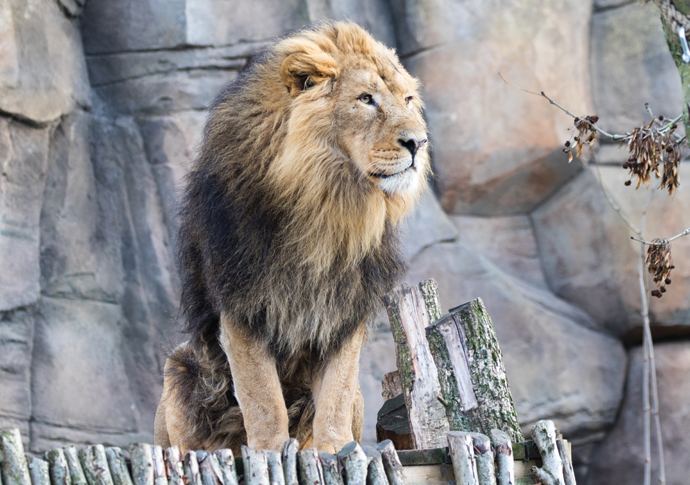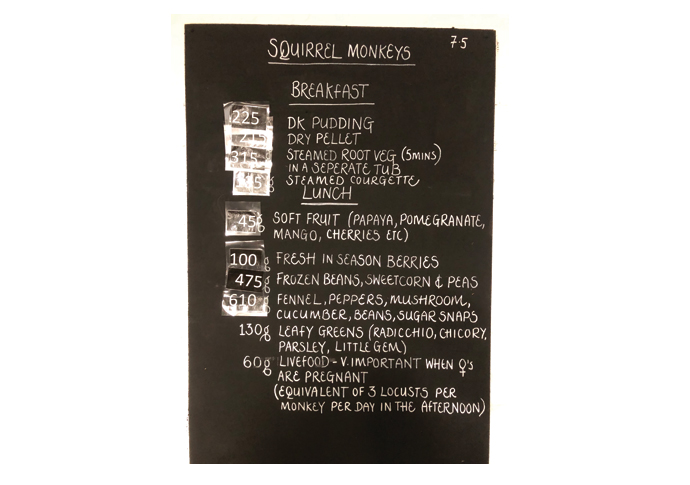Having a lion-in
Ever fancied having London Zoo to yourself, waking to hear its occupants roar? Then book a lodge for the night, says Dan Carrier
Thursday, 5th January 2023 — By Dan Carrier

Bhanu, one of London Zoo’s Asiatic lions. PHOTO: ZSL LONDON ZOO
THE little snout peeked out of the glorified cat flap and sniffed the freezing December air.
Two twinkling eyes shone in the gloom. Sniff, sniff, sniff – and then waddle, waddle waddle, out came the coati to see what we had for her.
Think overgrown guinea pig and you are about there. A coati comes from South America and uses its wonderfully long nose to sniff out snacks.
Cute, playful and easily pleased, it seems – the perfect guest.
No wonder the zoo keepers’ faces light up as they approach.
My seven-year-old son Laurie and I were invited to spend the night at London Zoo, under the charge of three brilliantly informed and perpetually interested keepers Lynden Sloane, SJ Stella and Lucy Twitcher. They guided us on a late-night ramble as part of the conservation body’s special Zoo Nights programme. It gives visitors the chance to meet the nocturnal animals and hear from their keepers about the 750 species and 18,000 animals they care for.
Arriving on a cold December afternoon, darkness fell as the gates were shut, and we had the place to ourselves.
Meeting the keepers at lodges in the lions’ area – huts with all you need for a cosy overnight – we were handed torches covered by a red film to keep disturbances to a minimum, and told to keep our voices down as we set off feeling like the winners of a Wonka Bar Golden Ticket.
Much of the zoo comes alive at night and stepping into these familiar surroundings as darkness falls is an otherworldly experience. Walking down paths normally packed with overexcited children has a cinematic quality, with a soundtrack provided by unexpected grunts, squawks, growls, squeaks and the odd roar.
As we were guided along and given the lowdown on each of the nightlife we’re saying hello to, I felt a little like a childhood hero, Gerald Durrell, and how he must have felt when he opened his first zoo. For a moment, it was possible to pretend this was our private menagerie: just my son, me and a global range of exotic creatures.

An example of the animals’ menus
We start at the kitchens to chop up some treats for the creatures we’re visiting. Hundreds of kilos of fresh vegetables and fruit is delivered by New Covent Garden Market each morning. While not cheap, the zoo explains they have to be sure of its quality – and have to be able to trace everything.
On the walls are the menus. We learn gibbons are partial to sweet potato, while the Diana monkeys can’t digest onions. Squirrel monkeys like steamed vegetables and for an afternoon treat, they nibble live locusts – with the instructions that any pregnant members of the troupe must have at least three.
Enchantingly, apes are served with a cup of herbal tea before bedtime.
Our guides make a point of not humanising the animals. As well as a encyclopedic knowledge of everything that breathes – even the interloping squirrels from Regent’s Park who like the free grub on offer – they are all part of a big family. The keepers’ role looks like that of benevolent older siblings, making sure their little sisters and brothers are healthy, happy, safe and sound.
And the animals seem to know it. The idea of how much a sloth, for example, can really understand – and at what point in the animal kingdom does the brain switch from lucid consciousness to running on instinct – is an endlessly fascinating question. At the zoo, the keepers forge close links – being a keeper is a calling – that despite the demarcation lines to ensure they have as natural a life as possible, the fondness between species is beautifully apparent.
The trip is inspirational, but tempered by a sense of longing. To watch two lions snuggled up together asleep is almost unbearable: the cold hard fact is if you were in among them, you’d be chomped rather quickly. But despite the knowledge of a bloody and painful end, one cannot help but wish to be on the other side of the thick glass, tucked up against those immensely tickle-able furry tummies.

Laurie and a friend looking out for penguins
They are, apart from the fact their teeth would sink that much deeper into your tantalising flesh, very similar to your moggie at home, we are told. From their daily habits to their throaty purrs, even down to their medication: we learn that when a lion has a vaccination, not only is it exactly the same a vet gives Tiddles, but despite the difference in size, the dose matches.
With dusk and dawn being their up-and-at-’em times, we were given an valuable and rare moment to check them on the prowl.
Less cuddly is the zoo’s komodo dragon. We learn the dragon has a horrifying way of killing its prey. They are fast over short distances, so they lie still, wait for a water buffalo to make the mistake of sauntering a little too close and bam! They lock their jaws on to the flesh. Their teeth has a little groove that carries a form of gangrene. When the dragon bites, the animal may not suffer a significant flesh wound. Instead the dragon follows its meal around for a few days as it gets steadily weaker, and then the komodo can go and finish the creature off. The idea of having that giant lizard walk behind you during your last week of life – it is one of many an informative bedtime story that made us feel like daring explorers.
From the dragons to something altogether more cuddlier. We step into the pitch-black world the marsupial called aye-ayes.
The aye-ayes grab branches and hang around as they look at you curiously, swaying as their body language screams “What-ho! Breakfast, you say?” in the spirit of 1970s TV star Johnny Morris.
And then its back to the lions. Dozing under a heater, we say our good nights. At the crack of dawn, they treat us to a roar that would shake even Johnny Weissmuller awake.
The male is prowling.
Spotting us, he comes gambolling over, to see if we are the bearers of breakfast, or perhaps breakfast itself. After a brief hello, the lion settles back down to contemplate the world around him, and we head home to contemplate the extraordinary, secret world we have just witnessed.
• To stay the night at London Zoo, see https://www.zsl.org/zsl-london-zoo/london-zoo-lodge